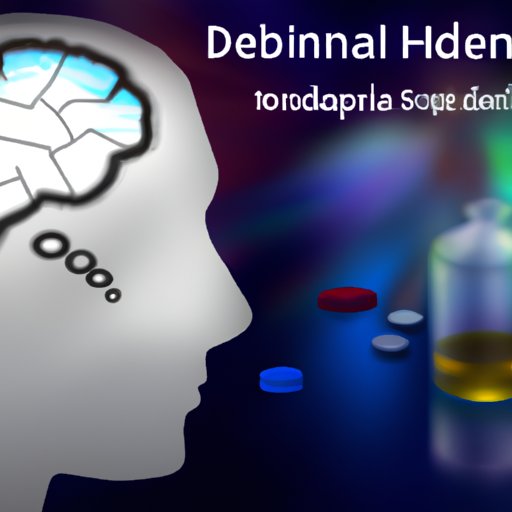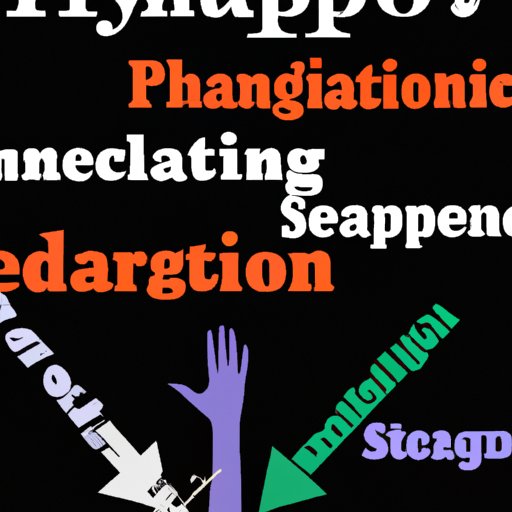Introduction
Addiction is a chronic disorder characterized by compulsive behavior that leads to psychological or physical dependence on a substance or activity. It can be caused by a variety of factors, including genetic predisposition, environmental influences, and personal choices. While addiction can have a significant impact on physical health, it can also have a profound effect on mental health. This article will explore how addiction affects mental health, including the role of substance abuse in mental illness, the connection between addiction and mental disorders, and the potential long-term effects of substance abuse on the brain.

Exploring the Relationship Between Addiction and Mental Health
Substance abuse plays a major role in mental illness. According to the National Institute on Drug Abuse (NIDA), nearly one third of people with mental illness also struggle with addiction. In addition, the NIDA reports that individuals with mental illnesses are more likely to use and abuse drugs than those without mental illness. Substance abuse can worsen existing mental health conditions and increase the risk of developing mental illness.
Behavioral patterns associated with substance abuse can further complicate mental health issues. People with addiction often engage in risky behaviors such as driving under the influence, engaging in unprotected sex, and using needles to inject drugs. These behaviors can lead to an increased risk of physical injuries, sexually transmitted diseases, and other health problems. Additionally, addiction can cause people to become isolated from friends and family, which can lead to feelings of loneliness and depression.
The effects of addiction on cognition, emotions, and social behaviors can be profound. Substance abuse can impair judgment, reasoning, and decision-making skills, leading to poor impulse control. Substance abuse can also alter mood and emotion, resulting in feelings of anger, sadness, and anxiety. Finally, addiction can lead to changes in social behaviors, such as difficulty interacting with others and engaging in inappropriate social situations.
Examining the Impact of Substance Abuse on Mental Well-Being
There are several risk factors for developing a substance abuse problem. These include genetics, family history of addiction, mental illness, peer pressure, and stress. Additionally, certain personality traits, such as impulsivity and sensation-seeking, can increase the risk of developing an addiction. It is important to understand the link between substance abuse and mental disorders in order to effectively address these risk factors.
Substance abuse can have a significant impact on mental well-being. People who struggle with addiction often have low self-esteem and poor self-confidence. They may also experience feelings of guilt and shame related to their substance use. Furthermore, substance abuse can make it difficult to manage stress, leading to feelings of hopelessness and despair.
Understanding the Correlation Between Addiction and Mental Illness
There are a variety of mental disorders that are associated with addiction. These include depression, anxiety, bipolar disorder, schizophrenia, post-traumatic stress disorder (PTSD), and Attention Deficit Hyperactivity Disorder (ADHD). Genetics and environmental factors can play a role in both addiction and mental illness. For example, people with a family history of addiction or mental illness may be at an increased risk of developing an addiction or mental illness themselves.
Analyzing the Connection between Substance Use and Co-Occurring Mental Health Disorders
Dual diagnosis, or co-occurring mental health and substance use disorders, is a common issue among those struggling with addiction. Dual diagnosis can complicate the treatment process and make it more difficult to achieve successful outcomes. It is important to identify signs of co-occurring mental health problems in order to ensure that individuals receive appropriate treatment.
Treatment strategies for dual diagnosis vary depending on the individual’s needs. Treatment typically involves a combination of medication, counseling, and other therapies. Medication can help to reduce cravings and manage symptoms of mental illness. Counseling can help to address underlying issues related to addiction and mental health. Other therapies, such as art therapy or yoga, can help to reduce stress and improve overall wellbeing.

Investigating the Neurobiological Effects of Addiction on Mental Health
The neurobiological effects of addiction can have a significant impact on mental health. Substances of abuse affect the brain’s neurotransmitters, which are responsible for regulating mood, behavior, and cognition. When these neurotransmitters are disrupted, it can lead to changes in mood, behavior, and thought processes.
The brain’s response to substance abuse can also have long-term effects on mental health. Chronic substance use can cause permanent damage to the brain, resulting in cognitive impairment and memory loss. Additionally, long-term substance use can lead to changes in behavior, such as increased aggression and impulsivity.

Evaluating the Link Between Trauma and Substance Abuse
Trauma can play a significant role in substance abuse. Childhood trauma, such as physical or sexual abuse, can increase the risk of developing an addiction later in life. Stress can also contribute to substance abuse, as people may use substances as a way to cope with difficult emotions or traumatic experiences. Self-medication is another factor that can contribute to substance abuse; people may use drugs or alcohol to numb emotional pain or to escape from reality.
Examining the Cycle of Self-Medication and Mental Health Struggles
Self-medication can be a dangerous cycle. People may use substances to cope with difficult emotions or to manage mental health symptoms, but this can ultimately lead to increased mental health struggles. People who self-medicate are at an increased risk of developing an addiction, as well as other mental health problems, such as depression and anxiety.
It is important to recognize the signs of unhealthy self-medication in order to prevent serious mental health issues. Signs of self-medication may include using drugs or alcohol to cope with difficult emotions, using substances to avoid dealing with problems, and using substances to increase energy or improve mood.
Treatment options for self-medication vary depending on the individual’s needs. Treatment typically involves a combination of medications, counseling, and lifestyle changes. Medications can help to reduce cravings and manage symptoms of mental illness. Counseling can help to address underlying issues related to addiction and mental health. Lifestyle changes, such as exercise, healthy eating, and stress management, can also help to improve overall wellbeing.
Conclusion
This article has explored how addiction affects mental health. It has examined the role of substance abuse in mental illness, the link between addiction and mental disorders, the effects of addiction on cognition, emotions, and social behaviors, and the correlation between trauma and substance abuse. The article has also discussed the cycle of self-medication and mental health struggles, as well as the importance of recognizing the signs of unhealthy self-medication and seeking treatment for dual diagnosis.
In conclusion, it is important to understand the relationship between addiction and mental health in order to provide effective treatment. Treatment should address both addiction and any underlying mental health issues in order to achieve successful outcomes. Resources for help include mental health professionals, support groups, and online resources.
(Note: Is this article not meeting your expectations? Do you have knowledge or insights to share? Unlock new opportunities and expand your reach by joining our authors team. Click Registration to join us and share your expertise with our readers.)
